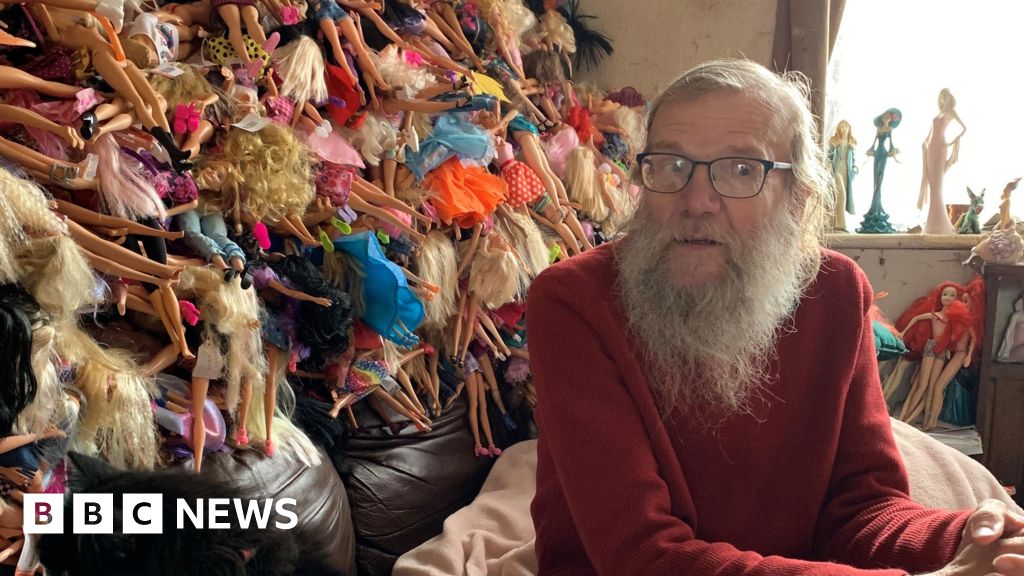Correspondent, BBC Midlands
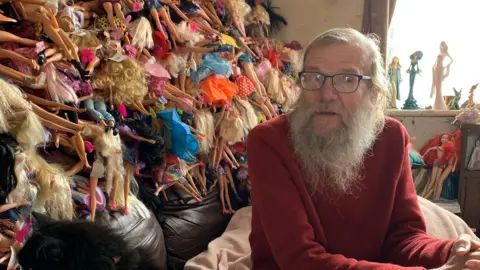 BBC
BBCHoarding in the UK has become a “mental health emergency” which requires an urgent response, a leading social enterprise has warned.
Clouds End CIC has been supporting more than 300 people who hoard in Birmingham, helping them to declutter their homes and encouraging them to attend mental health support groups.
It is an intervention project funded by Birmingham City Council, working closely with social services.
Estimates suggest 2-5% of the UK population may have hoarding disorder, which the World Health Organisation classified as a mental health condition in 2018. However, Heather Matuozzo, founder of Clouds End CIC, says the true number will have risen significantly since the pandemic.
“Anecdotally, and looking abroad, it’s quite seriously on the increase, but we don’t have the figures to prove it yet,” she said.
“Our referrals are certainly increasing – it’s a behind-closed-doors mental health emergency.
“You’re meeting people who have got stuck in life, some with some really heartbreaking stories. We need to act now.”
Hoarding disorder is characterised as a relentless accumulation of possessions which leads to cluttered living spaces that compromise their use or safety.
Typically, four out of 10 hoarders are over the age of 60.
The BBC has been following the work of Clouds End over a period of four months as they deliver a “Chaos 2 Order” project across Birmingham.
It’s one of the first dedicated hoarding projects of its kind in Europe – and it also provides training to agencies who might encounter hoarding behaviour in the course of a home visit.
Sue
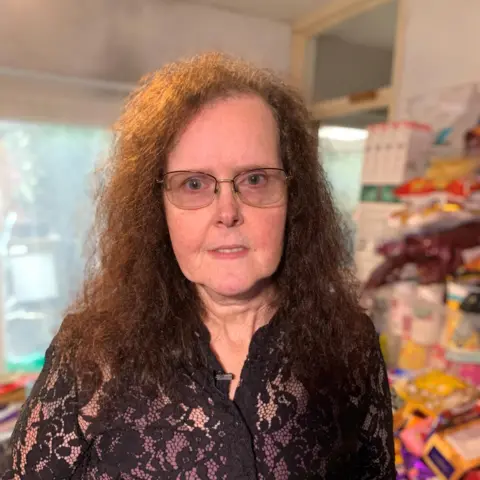
Sue began to hoard in her late teens. She told the BBC her parents separated when she was a young child; she lost contact with her father and felt increasingly isolated and traumatised as she grew up.
She began receiving support in 2020 after she had spent Christmas without any electricity because her power supply was being obstructed by her possessions.
She has since made huge efforts to clear her home in south Birmingham, but she recognises that it is a long haul.
“I’ve learnt that there is nothing to be ashamed of because hoarding isn’t the problem,” Sue said.
“It’s been the solution to people who have other problems, traumatic experiences, and people who have OCD.
“To those going through this – please reach out to your GP or to charities – and ask for help.”
Sue found comfort in being able to move bags and boxes from her home to her car and onto a charity shop – it became a regular and cathartic journey – and now she joins hoarding support groups to help others who are at the start of their own decluttering process.
“The help that is available in communities is very hit and miss,” she said.
“It’s usually charities that help rather than councils, and if they do get involved, it can be housing officers or social workers who tend to come in all guns blazing, because they have a job to do – get your house cleared.”
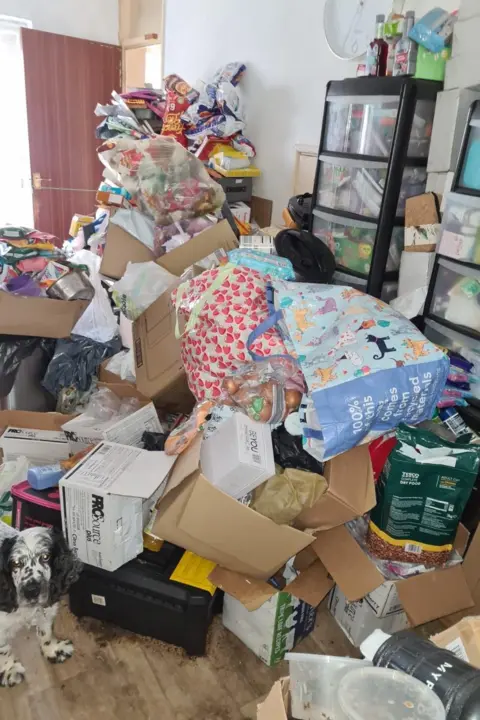
David
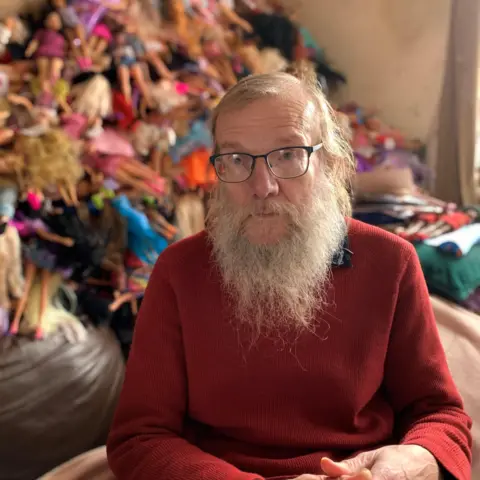
David is living in the home he grew up in. After his father’s death, he became a carer for his mother who had dementia. Now he’s living there on his own after she died.
David’s lounge is a riot of colour – on the floor of his living room are porcelain figurines, hundreds of yellowed newspapers and, balanced across the back of his settee, several thousand Barbie dolls.
“I started collecting them about eight years back. If I see one I haven’t got, I buy one,” the 65-year-old said.
“My doctor called at my house, but the entrance was blocked – that was the moment I got some help.”
A few years ago, David agreed to declutter his home with Ms Matuozzo’s help, but he’s now returned to intensive hoarding – with recent deliveries to his home of dozens of bars of soap, shampoos and piles of more boxed-up Barbies.
When the BBC asked him, “Why is it all back?”, David said: “Well, you can’t cure me of being a hoarder, can you? I find it comforting.”

Extensive hoarding can pose a significant risk to life.
Since 2021 in the West Midlands alone, six people have died and 33 injured in fires in hoarded properties, according to data from West Midlands Fire Service.
Ms Matuozzo says decluttering has become a new form of social care, but she feels the government could implement a new national hoarding strategy that’s widespread and funded.
She also hopes to create a Hoarding Charter, which would see Birmingham become the first Hoarding Awareness city in the world.
Currently, many individual local authorities have action plans, working alongside the NHS, but there is no national policy, or what Heather calls a UK “call to action”, that recognises the deep-seated trauma people are facing every day.
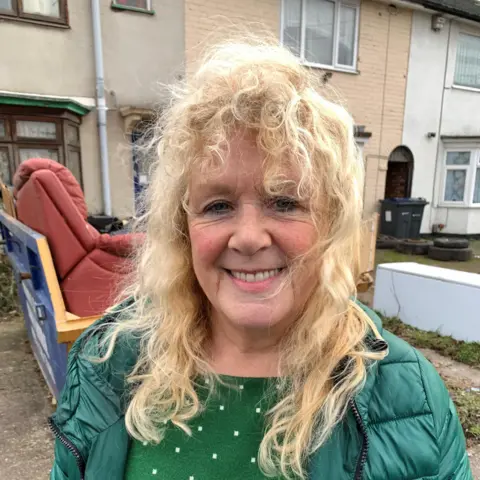
“We need a framework. If people don’t have an idea of what to do, then very often they will just do nothing or shunt it on to somewhere else,” Ms Matuozzo said.
“We need to be prepared for the future.”
The US is leading the way on this. In July 2024, a US Senate committee published a detailed report about the prevalence of hoarding in society, warning that it was approaching pandemic levels alongside an ageing population.
There are 14 million people in the United States exhibiting signs of hoarding disorder, the report states, and discussions are underway about new policies.
The British Psychological Society published guidelines last year too, aimed at social care and NHS interventions.
Sam Wainman is a PhD doctoral researcher in Hoarding Disorder at the University of Birmingham.
“Many people hoard in an attempt to keep hold of memories; sometimes the death of a loved one can be a trigger, but it can feel like control in a world that’s out of control,” Mr Wainman said.
“Professionals are trying their best in their own workplaces to forward policies, but we’re not aware of anything national or government-led. This would need to be a focus first on the person and not their possessions.”
When asked about calls for a national strategy to tackle hoarding, a Department of Health and Social Care spokesperson said: “People with mental health issues are not getting the support or care they deserve, which is why we will fix the broken system we inherited as a government to make sure we give mental health the same attention and focus as physical health.
“So that people have the support they need when they need it, this government will recruit an additional 8,500 mental health workers and invest £26m to open new mental health crisis centres.”
